Moiponi & Shale
A daughter's story
By Dave Bezaire
Moiponi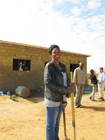
Molepolole, Botswana
Photo by Dave Bezaire
Shale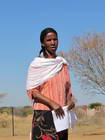
Molepolole, Botswana
Photo by Dave Bezaire
Tree from Habitat
Molepolole, Botswana
Photo courtesy of Lisa Powell
GV Team at Shale's 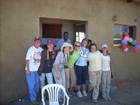
Molepolole, Botswana
Photo courtesy of Casey McCormick
Before the ceremony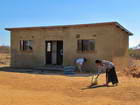
Molepolole, Botswana
Photo by Dave Bezaire
Shale's house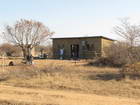
Molepolole, Botswana
Photo by Dave Bezaire
Inside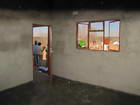
Molepolole, Botswana
Photo by Dave Bezaire
Front entrance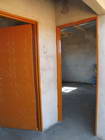
Molepolole, Botswana
Photo by Dave Bezaire
Shale & mason
Molepolole, Botswana
Photo by Rebecca Bezaire
Moiponi, the 29 year old daughter of future homeowner Shale–whose Habitat house we are finishing this week–provided some interesting insights into life in Botswana.
Shale has 5 children, ages 29 to 7, and 2 grandchildren that live with her. She is a single mother who travels to Gaborone to work about 1 week a month as a maid. Shale says that she hasn’t been able to find work in Molepolole, and relies on her eldest daughter, Moiponi, to help with expenses.
The 600 pula Shale earns a month is not enough to pay for rent, electricity, food for 8, and school expenses. In fact, it costs her about 2000 pula a year to pay for the school uniforms and supplies!
Shale is looking forward to moving into her Habitat house the second week of August because it is bigger than the one she is renting and will be hers once she pays off the mortgage.
Although Moiponi has a full-time job, she struggles financially given that she plans to make most of the monthly payments for her mother’s house. Here is a quick breakdown of her income and expenses.
Moiponi works as a cleaner at a meat inspection station, which is in one of Botswana’s strongest industries since they export large quantities of beef to Germany and other European Union countries. She has one child and a boyfriend who she plans to marry in December. Her boyfriend works for the water utility, and provides her some financial assistance when he can. Moiponi’s mother cares for her child during the week when she goes to work in Lobatse, a city south of Gaborone.
Moiponi’s job pays 1000 Pula per month, which equates to about US $170, but it goes out quickly. She rents a small place in Lobatse for 200 Pula ($34) per month, and she pays another 200 Pula per month to ride the bus to and from Lobatse each weekend. So, already she is down to 600 Pula to live on.
Food is usually purchased in quantity for two months at a time including maize meal, sorghum (a melon that is used to create a grits–like porridge), 5 kilograms of rice, tomato sauce, mayonnaise and sugar. The cost is 150 Pula ($25), which breaks down to 75 Pula per month.
Shale has other children, and will not be able to pay for her Habitat home from her own resources. Rather, she is depending on Moiponi to pay for the house. Moiponi has a younger brother who works, but she is doubtful of the support he will provide. The house payment will be 300 Pula ($50) per month for 5 years after which a final settlement will be calculated to cover the entire house cost. After the house has been fully paid off, she hopes to also come up with another 470 Pula ($80) to connect to the electric service.
The bottom line for Moiponi is about 225 Pula to live on after buying food and making her mom’s house payment. That equates to about US$38. Although she is a very cheerful and bright woman, Moiponi’s assessment is that “things will be very difficult”.

 Who
Who